5 Ways Reading Makes You a Better Writer
Search for tips on how to be a better writer and you’ll find this piece of advice anywhere: read. It’s no secret that reading is good for you, but no one benefits more from reading books than people who want to write their own. Reading can teach you a lot about the craft of writing, so if you really want to improve your skills, start by expanding your library. Books are among your greatest tools for writing success!
So to elaborate on the second point of my list of good writing habits, here are five ways that reading makes you a better writer. Enjoy, and best of luck in your writing career!
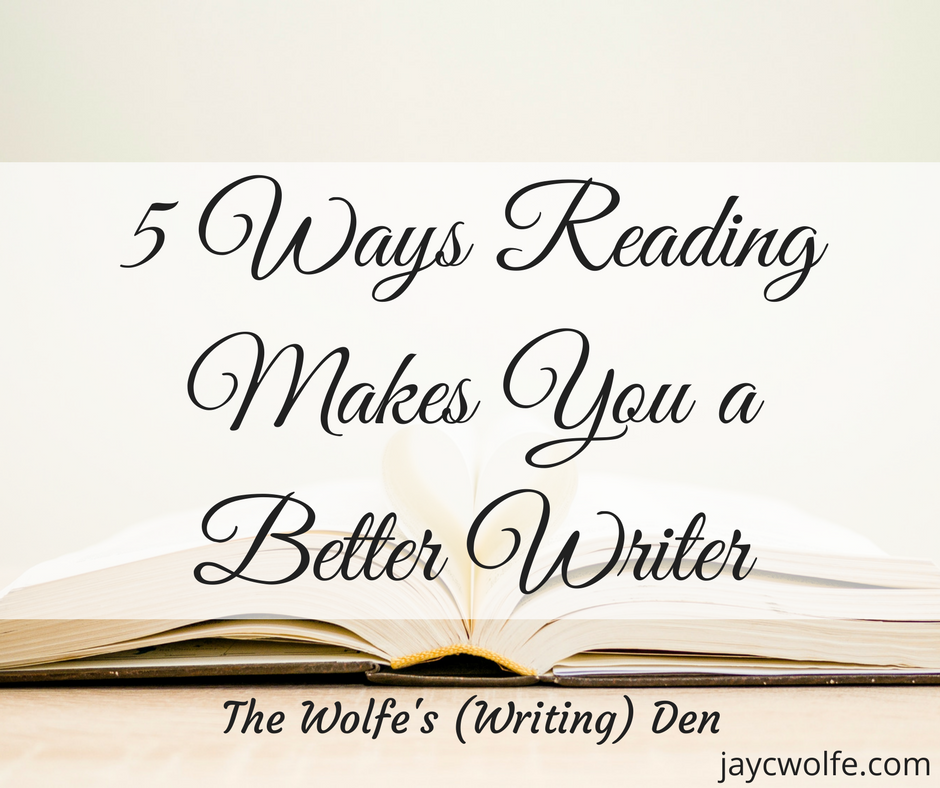
1) Reading teaches you the basics of story structure.
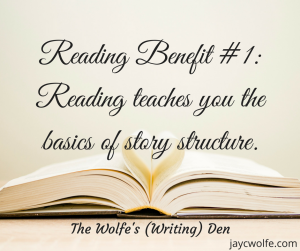 Let’s start with the obvious, shall we? If you want to learn how to write a story, the best way to start is by reading one. It’s as simple as that—so simple, in fact, that we already learned this lesson as children!
Let’s start with the obvious, shall we? If you want to learn how to write a story, the best way to start is by reading one. It’s as simple as that—so simple, in fact, that we already learned this lesson as children!
Think about the last time you read a fairy tale or watched a Disney movie. Notice that these stories always have a very basic plot structure: Hero enters, Villain causes Conflict, Hero fights Villain, Hero defeats Villain, everyone lives Happily Ever After. Doesn’t get any simpler than that, does it?
Dramatic structure refers to these steps as exposition, rising action, climax, falling action, and resolution. Of course, not all stories will follow exactly the same outline—you don’t always need a villain to create conflict, for example—but regardless of content, they will invariably have structure. Reading many books in various genres will reveal what all stories have in common, and that’s the first step toward becoming a master of fiction!
2) You learn what works in a story (and what doesn’t).
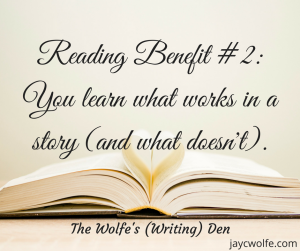 After learning the basics of story structure, the next step is to learn how to write a good story. This is easier said than done, which is why it’s important to read as many good books as possible. Only by understanding what works in other writers’ stories can you figure out how to improve yours.
After learning the basics of story structure, the next step is to learn how to write a good story. This is easier said than done, which is why it’s important to read as many good books as possible. Only by understanding what works in other writers’ stories can you figure out how to improve yours.
Now I know what you’re thinking: If art is subjective and everyone has different tastes, how can you know which books are “good”? The only way to be sure is by reading as many as you can and deciding for yourself what makes a story worth reading. An excellent piece of advice for beginning writers is to start by writing what you like, and you can’t know what you like unless you read!
Of course, bad books can be just as eye-opening as good ones. Who among us hasn’t tried to slog their way through a terribly written novel with flat characters and boring plot points? I know it sounds like torture, but the good news is that reading a bad book isn’t a complete waste of time: by recognizing the flaws that turn you off to someone else’s story, you’ll know what to avoid in yours. In short: Be the next J.K. Rowling, not the next Stephenie Meyer!
3) You get a better sense of how to write in your genre.
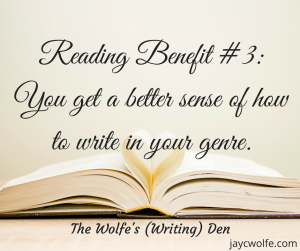 While reading is good in general, reading certain types of stories can be especially beneficial for writers. Every genre has its distinct traits, so reading in your genre of choice can teach you specific writing techniques that you couldn’t pick up from other books.
While reading is good in general, reading certain types of stories can be especially beneficial for writers. Every genre has its distinct traits, so reading in your genre of choice can teach you specific writing techniques that you couldn’t pick up from other books.
If you want to write fantasy, read series like Harry Potter or The Lord of the Rings to learn how to incorporate magic into your world in a logical and believable way. If you choose dystopian fiction, books like 1984, The Handmaid’s Tale, or The Hunger Games will help you understand how to write a future society based on a single drastically different detail. Read Stephen King‘s stories to learn how to write thrilling suspense and horror, or read Jane Austen for a sense of how to write good romantic and historical fiction.
Whatever genre you choose to write in, read those types of books until you feel confident you can write a good story that fits the style… and then keep on reading! So long as you continue indulging in books, you’ll find that you’ll never stop learning for the rest of your writing career. Your stories can only keep getting better!
4) Books expand your imagination.
 When I started reading as a little kid, it opened my entire world to hundreds of new possibilities. My love of books inspired me to start writing when I was nine years old, and I’ve never looked back. I couldn’t tell you how many of my favorite story ideas have come from reading; to this day, no matter what kind of stories I write, I can always find some ideas from books I love and influence from my favorite authors in them!
When I started reading as a little kid, it opened my entire world to hundreds of new possibilities. My love of books inspired me to start writing when I was nine years old, and I’ve never looked back. I couldn’t tell you how many of my favorite story ideas have come from reading; to this day, no matter what kind of stories I write, I can always find some ideas from books I love and influence from my favorite authors in them!
Reading books is a great way to battle writer’s block because books are a rich source of ideas. You don’t have to outright copy other writers’ ideas, of course—in fact, you shouldn’t—but emulating the concepts and styles of writers you admire will help you develop more original ideas of your own in the long run.
So whenever you’re starved for ideas, pick up a novel and see what jumps off the page. You’d be surprised how many creative new ideas are hiding in plain sight on your shelf!
5) Reading replenishes your writing energy.
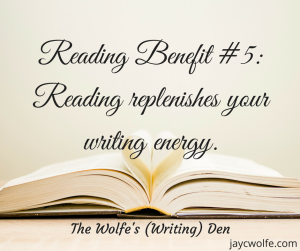 Despite all the previous points on this list, you don’t really need any other reason to read than the fact that it’s fun! Let’s face it, we all need regular breaks from our work, even when that work is our life’s passion (like writing). If you’re just not feeling the words flow, there’s no shame in stepping away from your story for a while to read someone else’s!
Despite all the previous points on this list, you don’t really need any other reason to read than the fact that it’s fun! Let’s face it, we all need regular breaks from our work, even when that work is our life’s passion (like writing). If you’re just not feeling the words flow, there’s no shame in stepping away from your story for a while to read someone else’s!
Reading has been proven to relieve stress and reduce anxiety, which is extra helpful for writers. What writer hasn’t felt stressed after hours of struggling with creative blocks or self-doubt, right? (I know I have.) Even if you are feeling relaxed and productive, fiction is a great escape from mundane routine. We’ve all had to recharge after long stretches of writing, and if you’re going to pause anyway, why not use that time to indulge in a hobby that will help you get better at it?
So the next time you feel drained of the energy to write, try picking up a book. You may find it’s just the thing you need to get you back on your writing streak!
What are your thoughts on these benefits of reading? How has reading made you a better writer?
Photo by Michał Grosicki on Unsplash
Word of the Week: Gramercy
Word: gramercy
Pronunciation: grə-MƏR-see
Part of Speech: interjection
Definition: used to express gratitude or surprise
Source: Merriam-Webster
“Gramercy for thy courtesy,” replied the Disinherited Knight, “and to requite it, I advise thee to take a fresh horse and a new lance, for by my honour you will need both.”
– Ivanhoe (Sir Walter Scott, 1820)
With Thanksgiving coming up this week, it’s a great time to learn a new word for expressing thankfulness! Today’s Word of the Week entry features a fascinating word I stumbled upon while looking up synonyms for “thankful”. Indeed, this word is so archaic that I couldn’t even find it in my usual source, Oxford Dictionaries, and instead had to look it up in Merriam-Webster. It never hurts to know as many expressions of thanks as possible, but if you truly want to impress someone with an obscure interjection, try “Gramercy!”
“Gramercy” is an interjection used to express surprise or gratitude. The word arose in the 14th century and comes from the Old French expression grant merci, meaning “great thanks”. The former adjective derives from the Latin adjective grandis “grand”, while the latter noun stems from the Latin noun mercēs “reward”.
Today, “gramercy” appears mostly as a proper noun, while the original use of the word as an interjection of gratitude or exclamation of surprise has since become archaic (case in point: the only examples in literature I could find, including the one above, were from stories set in the Middle Ages or earlier). Notably, the word also functions as a noun meaning “thanks” (also archaic), and can be written in the plural form “gramercies”. If you write historical fiction with characters who often need to express thanks or sudden strong feelings, “gramercy” may be an excellent word to work into your stories!
What are your thoughts on this word? Any suggestions for future “Word of the Week” featured words?
The Warm Scents of Autumn (Colleen’s Weekly #Poetry Challenge – #Tanka)
Sweet scents fill the air
Colored leaves and pumpkin pies
On the crisp fall breeze
Autumn’s welcoming embrace
Always warms my homesick heart
My response to the third of Colleen Chesebro‘s Weekly Poetry Challenges for November: Smell & Cozy. The twist for this month is to only use synonyms for the prompt words! For this challenge, I chose to write an autumn-themed tanka. I hope you enjoy the poem! Thanks for the prompt, Colleen!
5 Good Writing Habits of Productive Writers
In many ways, fiction writing is a profession without routine. One day you’re outlining your plot and character descriptions, another you’re writing or editing scenes, still another you’re preparing your novel for publication and marketing. It’s a great career path for artists who like to be surprised by their work every day! But there is one thing that separates the truly productive writers from the dreamers and wannabes, and that’s developing good writing habits. If you really want to be a professional writer, you must build these habits; they’re the best way to keep you writing your whole life!
So for those of you who are serious about being productive writers, here are five good writing habits you should start developing today. Enjoy, and best of luck in your writing career!
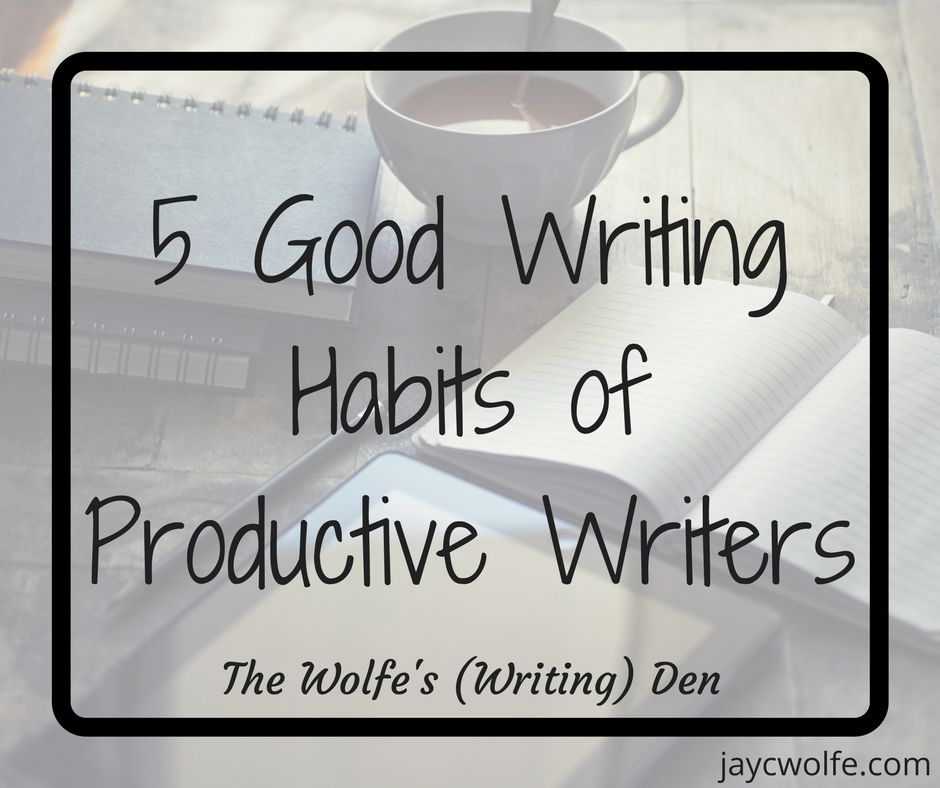
Good Writing Habit #1: Write every single day.
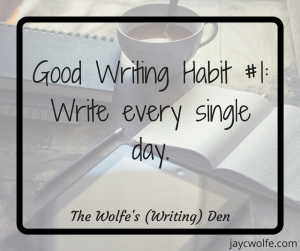 If you truly want to be a writer, you must write; otherwise you’re just a dreamer with an idea. But it’s not enough to write every once in a while; then you’re just a dreamer who sometimes writes their ideas down. If you’re serious about dedicating your life to writing, you must make writing your life. Not tomorrow, not in a week or a month or a year, today. Make every today a writing day. If that sounds harsh and repetitive, get ready because you’ll hear this advice everywhere until it sinks in: if you want to be a writer, you must write every single day.
If you truly want to be a writer, you must write; otherwise you’re just a dreamer with an idea. But it’s not enough to write every once in a while; then you’re just a dreamer who sometimes writes their ideas down. If you’re serious about dedicating your life to writing, you must make writing your life. Not tomorrow, not in a week or a month or a year, today. Make every today a writing day. If that sounds harsh and repetitive, get ready because you’ll hear this advice everywhere until it sinks in: if you want to be a writer, you must write every single day.
Of course, writing every day won’t always be easy (that’s what Habits 4 and 5 are for), but even the smallest steps of progress are better than not getting anything done at all. If you really have trouble writing when you should, try setting a writing schedule or some simple tasks to ensure you stay productive. Write down new ideas, outline your novel, work on a short story or a new scene of your book. Whatever you do, make sure you log some writing time every day until it becomes a habit. Hard as it may seem at first, you’ll soon find that it feels wrong not to write every day. Your future novelist self will thank you!
Good Writing Habit #2: Read as often as possible.
If you don’t have time to read, you don’t have the time (or the tools) to write. Simple as that. – Stephen King, On Writing
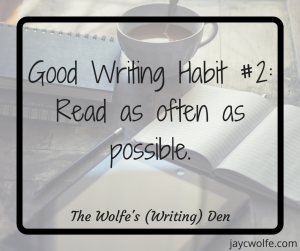 This may sound like a given, but you’d be amazed how many aspiring writers “don’t have time to read.” A thorough search through guest posts on writing blogs will reveal that virtually every editor, at one time or another, has rolled their eyes at a wannabe novelist who didn’t have a good answer to the question, “So what are you reading?” If you never want to be caught off guard by this question, always make time to read!
This may sound like a given, but you’d be amazed how many aspiring writers “don’t have time to read.” A thorough search through guest posts on writing blogs will reveal that virtually every editor, at one time or another, has rolled their eyes at a wannabe novelist who didn’t have a good answer to the question, “So what are you reading?” If you never want to be caught off guard by this question, always make time to read!
The point of reading often is to get a better feel for the craft of writing. The more books you read, the more you’ll understand what makes a good story (or a bad one). Not sure where to start? Try picking up a few popular novels in your favorite genre; these will teach you what goes into writing that type of story, or at least give you an idea if it’s the right genre for you. Don’t have a favorite? Try some popular books in a variety of genres until you find one you love! As long as you keep reading, you’ll have the tools and inspiration you need to write!
Good Writing Habit #3: Write now, edit later.
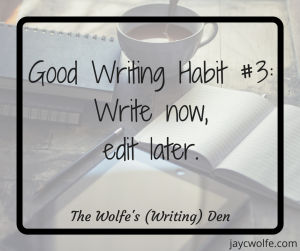 One of the most common mistakes that beginning writers make is to edit while writing. It’s a tough habit to break! I know this because I still do it myself, despite knowing better. Sometimes I’ll even go as far as to not continue a sentence until I’m sure I can get exactly the right wording onto the page the first time. But as I’ve found time and again, that’s not how writing works.
One of the most common mistakes that beginning writers make is to edit while writing. It’s a tough habit to break! I know this because I still do it myself, despite knowing better. Sometimes I’ll even go as far as to not continue a sentence until I’m sure I can get exactly the right wording onto the page the first time. But as I’ve found time and again, that’s not how writing works.
First drafts will always be messy. There’s no way around that. A story is never going to be perfect right out of the gate, and that’s okay. The point of a first draft is just to get the idea out of your head; perfecting it comes later, during the editing phase. The sooner you accept this, the more productive you’ll become in your writing. So don’t worry about getting it right the first time; just keep writing and don’t look back until your first draft is done. Always remember: Done is better than perfect!
Good Writing Habit #4: Set a daily writing goal (and stick to it).
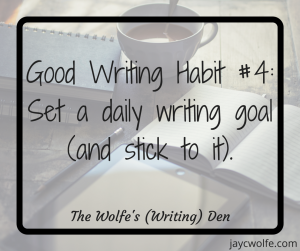 As a writer, there will be days when you simply can’t muster up the energy or motivation to write. That’s where daily writing goals come in. When you know you should write but can’t be sure how much will count as “productive”, it helps to set a daily word count goal. That way, you can write a “bare minimum” on those low-energy days and still feel like you made progress!
As a writer, there will be days when you simply can’t muster up the energy or motivation to write. That’s where daily writing goals come in. When you know you should write but can’t be sure how much will count as “productive”, it helps to set a daily word count goal. That way, you can write a “bare minimum” on those low-energy days and still feel like you made progress!
Stephen King recommends starting at 1000 words a day, but it’s up to you to figure out what goal works best for you. If you’re way too busy to hit 1000 every day, feel free to lower the bar to a more achievable goal. Got plenty of free time on your hands? Push yourself to write 1500 or 2000 words a day! Not one for word counts? Set a daily goal instead to finish a chapter or edit one more scene. The key is to find the sweet spot of a goal low enough for you to reach every day but still high enough to bring you substantially closer to a finished work of art. Whatever goal you choose, always stay productive!
Good Writing Habit #5: Protect your writing time and space.
Be ruthless about protecting writing days, i.e., do not cave in to endless requests to have “essential” and “long overdue” meetings on those days. – J.K. Rowling
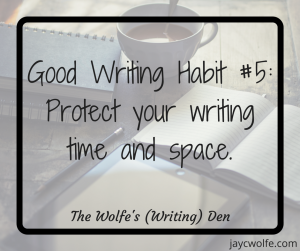 Writing is one of the loneliest professions in the world, but most writers like it that way. The problem is when we don’t have enough time or space to dedicate to our work. That’s why I can’t stress enough the importance of having a designated writing area and schedule. It’s just as important as setting a daily goal; you can’t hope to consistently meet your quota unless you can always get into the right mindset, and one of the best ways to do this is by retreating into a corner where your imagination can flow freely without distractions. If you build the habit of visiting this space at the same time every day, writing will become a lot easier in the long run!
Writing is one of the loneliest professions in the world, but most writers like it that way. The problem is when we don’t have enough time or space to dedicate to our work. That’s why I can’t stress enough the importance of having a designated writing area and schedule. It’s just as important as setting a daily goal; you can’t hope to consistently meet your quota unless you can always get into the right mindset, and one of the best ways to do this is by retreating into a corner where your imagination can flow freely without distractions. If you build the habit of visiting this space at the same time every day, writing will become a lot easier in the long run!
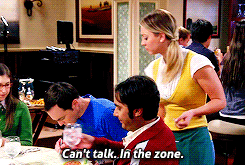 After setting your writing time and space, the next step is to guard them from the rest of your world. Writing time is sacred, and therefore should be treated as such. Close the door and work for at least an hour on a computer with no Internet connection, or for real distraction-free writing, try writing longhand on paper first and editing later as you transcribe your work to a computer. Also make sure to tell your loved ones not to disturb you during your writing time. My boyfriend understands this better than anyone I know: I love him to pieces, but he knows I’ll get crabby if he so much as tries to hug me while I’m “in the zone.” Such is the reality of a writer! Protect your writing time and space and the rest of your world will be better for it!
After setting your writing time and space, the next step is to guard them from the rest of your world. Writing time is sacred, and therefore should be treated as such. Close the door and work for at least an hour on a computer with no Internet connection, or for real distraction-free writing, try writing longhand on paper first and editing later as you transcribe your work to a computer. Also make sure to tell your loved ones not to disturb you during your writing time. My boyfriend understands this better than anyone I know: I love him to pieces, but he knows I’ll get crabby if he so much as tries to hug me while I’m “in the zone.” Such is the reality of a writer! Protect your writing time and space and the rest of your world will be better for it!
Do you practice these good writing habits? What other habits would you add to this list?
Word of the Week: Apoplectic
Word: apoplectic
Pronunciation: a-pə-PLEK-tik
Part of Speech: adjective
Definition: overcome with anger; extremely indignant
Source: Oxford Dictionaries
Remember that trending word from Merriam-Webster that I shared last week? Well, here’s the second word that was trending that week! This one comes from a Vanity Fair article published on November 1, which sparked a 38,000% increase in searches for today’s word after it was included in the article’s headline. Given the subject matter of the article, it’s easy to see why the author would opt for this word; when “furious” and “enraged” just aren’t enough to sum up someone’s anger, you can easily describe them as “apoplectic”!
To be “apoplectic” is to be extremely indignant or overcome with anger. The word arose in the early 17th century and traces back through the French adjective apoplectique and the Latin adjective apoplecticus to the Greek adjective apoplēktikós, meaning “stupefied” or “confused”. This adjective stems from the verb apoplēssein “disable with a stroke”, which in turn comprises two roots: the prefix apo “off” and the verb plḗssō “to strike”.
Before it fell into more general use, the word “apoplectic” was originally a medical term meaning “relating to or denoting apoplexy”, where “apoplexy” is defined as “unconsciousness or incapacity resulting from a cerebral hemorrhage or stroke”. Notably, the noun “apoplexy” has since gained an informal sub-definition related to the adjective form: “incapacity or speechlessness caused by extreme anger”. If your characters often get angry to the point of explosion, “apoplectic” may be an excellent word to include in your stories!
What are your thoughts on this word? Any suggestions for future “Word of the Week” featured words?


Recent Comments